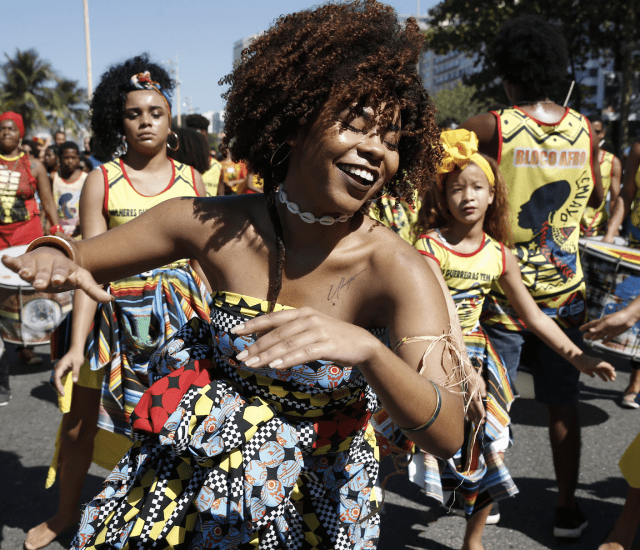From 1535 to 1888, over 5 million African slaves were taken to Brazil and exploited in the hands of plantation owners around the country. One of the common denominators among the diversity of cultures forming Sub-Saharan Africa, lies in the use of music for several purposes: educating the youth, initiation into tribal life, festivals, religion, war - everything was done in a musical setting. Music was a way for the enslaved people who were taken to Brazil against their will to feel closer to their origins. It created a sense of community amongst them. The influence of other music present in Brazil at the time also mixed with the African music, creating unique Brazilian genres.It all began with Candomblé and Capoeira. Candomblé was a religion practiced in Brazil’s slave quarters, and Capoeira is a martial art directly associated with the music. The percussion instruments used in both were key to developing what would eventually become Samba. With a clear African influence, samba was born in the houses of black Brazilians in Rio de Janeiro in the beginning of the 20th century. The first produced and recorded samba was Donga and Mauro de Almeida’s Pelo Telefone. The binary musical genre quickly gained popularity and was initially strongly associated with Carnival in Brazil. Samba became Brazil’s musical identity. Today, it is not only a musical genre, but also a style of dance and a tradition deeply rooted in the country’s history.
Given the enormous historical and demographic presence of African descendants in Brazil, the Afro-Brazilian musical continuum is vastly marking the rise of Afro-Brazilianism. Ijexá is a genre with origins in the rhythms dedicated to entities in Candomblé rituals. The rhythm suffered influences of Brazilian music, and from the 1970s on, Ijexá became a popular music genre in Brazil. Axé, born around the 1980s in Bahia, is another genre characterized by the intense use of percussion and the predominant use of instruments. Typical of the Afro-Baiana culture, it deals with themes related to the religion of the local population and traditions. Olodum, self-constituted as a cultural group that exalts negritude, tells the history of oppression, reveals social injustices, and denounces prejudice.
Every year in Brazil, over 30 thousand people dedicate themselves professionally to the Carnival parades where thousands of musicians play samba and axé songs together and tell stories accompanied by the professional samba dancers and parade cars. Outside of the professional Sambodromos, Carnival in Brazil attracted 22.1 million people from around the nation and around the world in 2020, the center of all this being samba, axé, and other sub-genres of Brazilian music descended from the influence of African music. Some names in the industry that marked the rise of African currents in Brazilian popular music include: Gilberto Gil, Caetano Veloso, Jorge Bens, João De Aquino, Djavan, Olodum, Martinho da Vila, Margareth Menezes, Netinho, Daniela Mercury and Ivete Sangalo.
This article is the result of a collaborative project between #AuxSons and Alejandro Abbud Torres Torija, professor at Sciences Po Paris Campus Reims, and regular contributor to #AuxSons. As part of the course “Sounds of the world: music as a mirror of intimacy and the collective”, international students from Sciences Po Paris Campus Reims looked at the links between music from the four corners of the world and sociopolitical issues.
The Authors :
Alice Pimentel is a British-Brazilian student of social sciences at Sciences Po. Since a very young age she has constantly been immersed in and surrounded by music. Throughout her childhood and adolescence, she took classes to learn various instruments and her biggest passion has always been singing and playing the piano. As a part of her graduation, she aims to study and understand the links between music and our society and the role music plays in our lives.
Jade Vincent is a French-Brazilian student at Sciences Po Paris-Reims campus, majoring in Politics and government with a minor in International Relations. Though I never formally worked as a writer, I have always been keenly aware of the cultural and political differences that separate us, the nuanced characteristics and our shared humanity that unites us despite our differences making me passionate about always sharing my experiences and the things I learn about cultures, traditions, and societies.
Photo : July 2017 in Rio de Janeiro - Women in Copacabana celebrating International Afro-latin American, Afro-Caribbean and diaspora women’s day - © Tânia Rêgo / Agência Brasil


